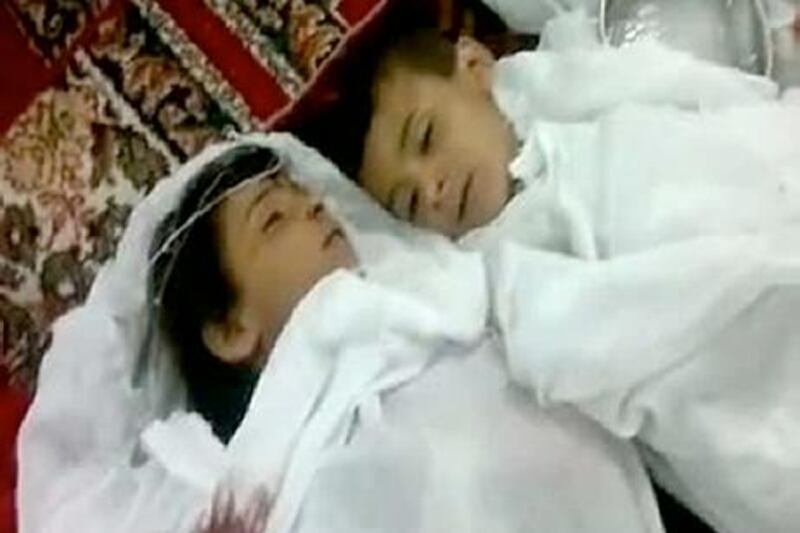Pro-regime militiamen swept through farmlands in central Syria slaughtering dozens including women and children, activists said today, sparking opposition calls for increased military raids by armed rebels.
The latest massacre came as Washington demanded a full transfer of power in Syria, setting the stage for a renewed diplomatic stand-off after Russia and China said they were strongly against intervention and regime change.
The Syrian Observatory for Human Rights said at least 55 people were killed in yesterday’s assault on the Al Kubeir area of the central province of Hama, and added that UN observers were rushing to the site to check on the massacre.
“There are 49 confirmed and identified victims in Al Kubeir, the majority of them from the Al Yateem family,” said Rami Abdel Rahman, head of the Britain-based Observatory.
“Among the dead are 18 women and children,” he said, adding that six other people were also killed yesterday in a village near Al Kubeir, which is in a farming area northwest of Hama city.
Earlier tolls from opposition groups had put the death toll at between 87 and 100.
The Observatory was joined by the exiled opposition Syrian National Council (SNC) and the Muslim Brotherhood in blaming the killings on shabiha militiamen loyal to President Bashar Al Assad’s regime.
They and activists, citing survivors and witnesses, said the militiamen stormed into the small settlement yesterday afternoon armed with guns and knives after regime forces had earlier pounded it with shells.
They then went on a killing spree, hacking, stabbing and shooting residents as they tried to flee.
A video posted on YouTube showed bodies of several children, including babies, wrapped in blankets and white plastic body bags, purported to be victims of the massacre. Some were charred beyond recognition.
Each body had a label, and the video, whose authenticity could not immediately be verified, shows the faces of several dead infants. Dried blood can be seen on the face of one child.
The Syrian government denied responsibility, saying in a televised statement: “What a few media have reported on what happened in Al Kubeir, in the Hama region, is completely false.”
“A terrorist group committed a heinous crime in the Hama region which claimed nine victims. The reports by the media are contributing to spilling the blood of Syrians,” the statement said.
The opposition called for stepped up military assaults against regime forces in the wake of the reported massacre.
“The Syrian National Council calls on the (rebel) Free Syrian Army to step up military assaults on regime forces to break the siege against the civilian population and protect civilians throughout the country,” Mohammed Sermini, spokesman for the coalition, told AFP.
In a statement, the SNC also urged demonstrations on Thursday and Friday to denounce the killings.
The Al Kubeir incident comes after at least 108 people were killed in a two-day massacre that began on May 25 near the central town of Houla, most of them women and children who were summarily executed, according to the United Nations.
British Prime Minister David Cameron said in reaction to news of the latest “brutal and sickening” killings that the international community has to do more to isolate Damascus.
“We need to do much more to isolate Syria, to isolate the regime, to put the pressure on and to demonstrate that the whole world wants to see a political transition from this illegitimate regime to actually see one that can take care of its people,” Mr Cameron told reporters during a quick stop in Oslo.
In Beijing today, leaders of a grouping led by Russia and China issued a statement opposing military intervention in the Middle East.
The Shanghai Cooperation Organisation (SCO) also called for a “peaceful resolution of the Syrian problem through political dialogue” in a statement released at the end of a two-day summit.
“Member states are against military intervention into this region’s affairs, forcing a ‘handover of power’ or using unilateral sanctions,” it said, referring to the Middle East and North Africa.
Russia and China have vetoed two Security Council resolutions against Assad’s regime, but backed UN-Arab League peace envoy Kofi Annan’s blueprint to end the conflict in which more than 13,500 people have died since March 2011, according to the Observatory.
US Secretary of State Hillary Clinton, who has voiced mounting frustration with the Chinese and Russian positions, sought to mobilise support in Turkey, calling on the international community to “close off the regime’s economic life lines.”
“We can’t break faith with the Syrian people who want real change,” said a State Department official who briefed reporters late yesterday on Secretary Clinton’s meeting in Istanbul with officials from 16 regional and European powers.
She set forth “essential elements and principles that we believe should guide that post-Assad transition strategy, including President Assad’s full transfer of power,” the official said.
The Annan plan was supposed to begin with a ceasefire from April 12 but doubts have emerged about its effectiveness as violence has raged on despite the deployment of nearly 300 UN observers.





